Garden Maintenance in Pinner
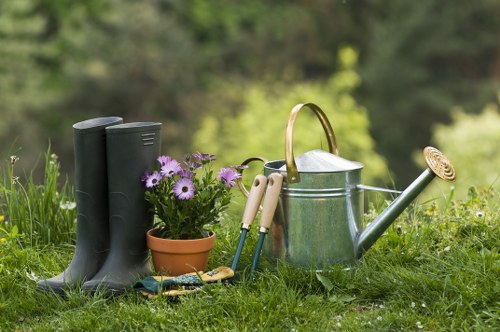
Introduction to Garden Maintenance
Maintaining a beautiful garden in Pinner requires dedication, knowledge, and the right resources. Whether you're a seasoned gardener or just starting out, understanding the essentials of garden care can transform your outdoor space into a vibrant oasis.
From selecting the right plants to regular upkeep, garden maintenance encompasses a variety of tasks that ensure the health and aesthetics of your garden. In Pinner's unique climate, certain practices can make a significant difference in the success of your garden.
In this article, we will explore the key aspects of garden maintenance in Pinner, offering tips and strategies to help you achieve a flourishing garden all year round.
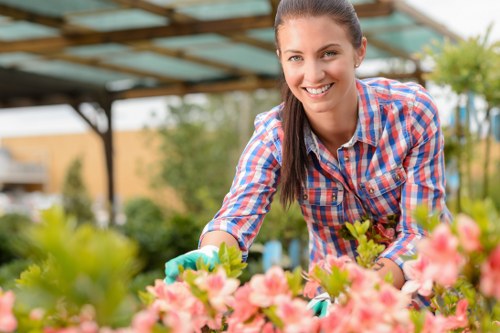
Understanding the Pinner Climate
Climate Overview
Pinner, located in the London Borough of Harrow, experiences a temperate maritime climate. This means mild summers, cool winters, and precipitation spread throughout the year.
The average temperature ranges from 2°C in winter to 22°C in summer. Understanding these seasonal variations is crucial for effective garden maintenance.
Moreover, Pinner's climate supports a diverse range of plant species, making it an ideal location for gardeners looking to cultivate both native and exotic plants.
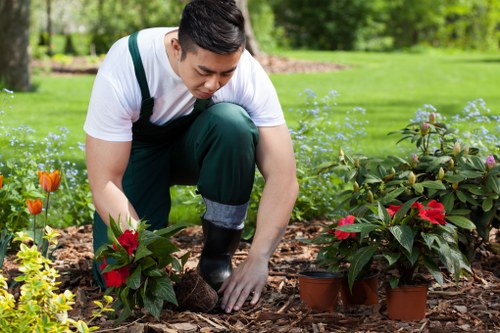
Essential Garden Maintenance Tasks
Regular Weeding
Weeding is a fundamental aspect of garden maintenance. It prevents unwanted plants from competing with your desired flora for nutrients and water.
Effective weeding involves not only removing the visible weeds but also addressing their roots to prevent regrowth.
Using tools like a hoe or a hand weeder can make this task more manageable and less time-consuming.
Pruning and Trimming
Pruning helps maintain the shape and health of your plants. It encourages new growth, removes dead or diseased branches, and enhances airflow within your garden.
Different plants require different pruning techniques, so it's essential to research the specific needs of each species in your garden.
Regular trimming also keeps your garden looking tidy and well-maintained.
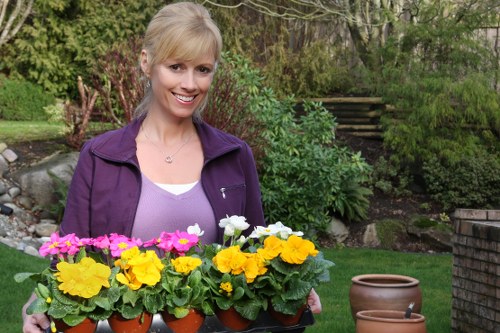
Choosing the Right Plants for Pinner Gardens
Native Plants
Native plants are well-suited to Pinner's climate and soil conditions. They require less maintenance and are more resistant to local pests and diseases.
Incorporating native species can enhance your garden's sustainability and support local biodiversity.
Some popular native plants for Pinner gardens include lavender, foxgloves, and daisies.
Seasonal Planting
Understanding the best times to plant can significantly impact the success of your garden. Pinner's seasonal variations mean different plants thrive at different times of the year.
Spring is ideal for planting bulbs and perennials, while summer favors annuals and vegetables. Autumn is perfect for planting trees and shrubs, and winter is a good time for preparing garden beds and planning for the next season.
By aligning your planting schedule with the seasons, you can ensure continuous growth and blooming throughout the year.
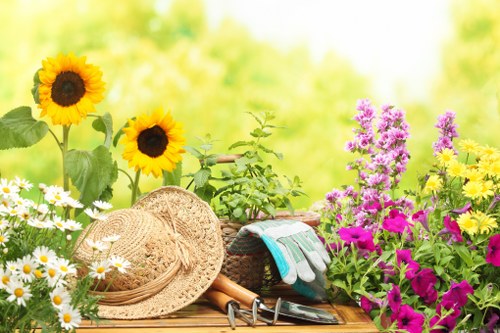
Soil Health and Fertilization
Soil Testing
Healthy soil is the foundation of a thriving garden. Conducting regular soil tests helps determine the pH levels and nutrient content, allowing you to make informed decisions about fertilization.
In Pinner, the soil can vary, so understanding its composition is key to selecting the right fertilizers and amendments.
Amending the soil with compost or organic matter can improve its structure, drainage, and nutrient-holding capacity.
Organic Fertilizers
Using organic fertilizers promotes sustainable gardening practices. They release nutrients slowly, reducing the risk of over-fertilization and environmental impact.
Options include compost, manure, bone meal, and fish emulsion. These fertilizers not only nourish plants but also enhance soil health over time.
Incorporating organic fertilizers into your garden maintenance routine can lead to robust plant growth and a healthier ecosystem.
Pest and Disease Management
Identifying Common Pests
Garden pests can cause significant damage if not addressed promptly. Common pests in Pinner gardens include aphids, slugs, and caterpillars.
Regular monitoring allows for early detection and effective management of infestations.
Implementing natural pest control methods, such as introducing beneficial insects or using organic repellents, can minimize damage without harming the environment.
Preventive Measures
Preventing diseases starts with maintaining overall garden health. Practices such as proper spacing, adequate watering, and regular pruning can reduce the likelihood of disease outbreaks.
Using disease-resistant plant varieties and rotating crops can also help maintain a healthy garden.
Educating yourself about common plant diseases in Pinner and their symptoms is essential for timely intervention.
Watering and Irrigation
Efficient Watering Practices
Watering is a critical component of garden maintenance. Overwatering or underwatering can stress plants and lead to poor growth.
In Pinner's climate, it's important to adjust your watering schedule based on seasonal rainfall and temperature changes.
Using techniques like drip irrigation or soaker hoses can improve water efficiency and ensure plants receive consistent moisture.
Rainwater Harvesting
Rainwater harvesting is an eco-friendly way to supplement your garden's water supply. Collecting rainwater reduces dependence on mains water and promotes sustainable gardening.
Implementing rain barrels or other storage systems can make rainwater readily available during dry periods.
Not only does this practice conserve water, but it also provides plants with naturally soft water, free from chemicals found in tap water.
Lawn Care and Maintenance
Grass Selection
Selecting the right type of grass is essential for a lush and resilient lawn. In Pinner, cool-season grasses like perennial ryegrass and fescues are well-suited to the climate.
These grasses thrive in cooler temperatures and can withstand the region's seasonal changes.
Proper grass selection ensures a healthy lawn that can endure foot traffic and varying weather conditions.
Mowing Techniques
Regular mowing encourages dense, healthy grass growth. It's recommended to mow your lawn to a height of about 2.5 to 3.5 inches, depending on the grass type.
Sharpening mower blades and mowing at the right height can prevent damage and promote vigorous growth.
Additionally, varying your mowing pattern can prevent soil compaction and promote even growth.
Seasonal Garden Care
Spring Maintenance
Spring is a time of renewal for gardens. Tasks include clearing debris, pruning shrubs, and planting new flowers.
Applying a balanced fertilizer in early spring can provide essential nutrients for new growth.
Preparing your garden beds with compost and mulch can enhance soil fertility and moisture retention.
Summer Upkeep
During the summer months, focus on watering, pest control, and deadheading flowers to encourage continuous blooming.
Regularly monitor your garden for signs of stress or disease, and take prompt action to address any issues.
Providing adequate shade and ventilation can help prevent overheating and dehydration of plants.
Autumn Preparation
Autumn is ideal for planting perennials and preparing your garden for the winter months. Tasks include raking leaves, tilling soil, and applying mulch.
Planting bulbs in the fall ensures a colorful display in the spring.
Protecting sensitive plants with covers or moving potted plants indoors can safeguard them from frost and freezing temperatures.
Winter Care
Winter garden maintenance focuses on protecting plants and planning for the upcoming year. This includes pruning, cleaning garden tools, and ordering seeds.
Using frost-resistant covers and ensuring proper drainage can help prevent winter damage to your garden.
Reflecting on the past season and setting goals for the next can lead to a more successful gardening experience.
Hardscaping and Garden Structures
Pathways and Patios
Hardscaping elements like pathways and patios enhance the functionality and aesthetics of your garden. They provide structure and define different areas for activities and relaxation.
Choosing the right materials, such as gravel, pavers, or stone, can complement your garden's overall design.
Regular maintenance, including cleaning and sealing, ensures these structures remain in good condition.
Fencing and Boundaries
Installing fencing or other boundary markers can provide privacy, security, and protection for your garden. It also helps in containing pets and deterring unwanted wildlife.
There are various fencing options available, including wooden, metal, and vinyl, each offering different benefits and aesthetics.
Proper installation and regular upkeep are essential for maintaining the integrity and appearance of your garden boundaries.
Decorative Elements and Enhancements
Garden Lighting
Garden lighting adds both beauty and functionality to your outdoor space. It highlights key features, extends usability into the evening, and enhances safety.
Solar-powered lights and LED fixtures are energy-efficient options that can be strategically placed to illuminate pathways, plants, and structures.
Incorporating lighting into your garden design can create a magical atmosphere after sunset.
Water Features
Water features like fountains, ponds, and waterfalls add a serene and calming element to your garden. They attract wildlife and can improve the overall ambiance.
Proper maintenance of water features includes regular cleaning, ensuring water circulation, and managing algae growth.
Choosing a water feature that complements your garden's size and style can enhance its visual appeal.
Garden Art and Decorations
Incorporating art and decorations can personalize your garden and reflect your style. This includes sculptures, wind chimes, and decorative pots.
Selecting weather-resistant materials ensures that your garden art withstands the elements and remains vibrant.
Thoughtfully placed decorations can serve as focal points and add character to your garden space.
Sustainable Gardening Practices
Composting
Composting is an eco-friendly way to recycle garden waste and kitchen scraps into nutrient-rich soil. It reduces landfill waste and improves soil health.
Setting up a compost bin in your garden allows you to easily manage organic materials and produce valuable compost for your plants.
Regularly turning the compost pile ensures proper aeration and accelerates the decomposition process.
Mulching
Mulching involves covering the soil surface with materials like bark, straw, or compost. It conserves moisture, suppresses weeds, and regulates soil temperature.
Applying a layer of mulch around your plants can enhance their growth and reduce the need for frequent watering.
Organic mulches also break down over time, adding nutrients to the soil and improving its structure.
Hiring Professional Garden Maintenance Services
Benefits of Professional Services
While DIY garden maintenance can be fulfilling, hiring professional services in Pinner offers numerous benefits. Professionals have the expertise and equipment to handle complex tasks efficiently.
They can provide tailored maintenance plans based on your garden's specific needs, ensuring optimal health and aesthetics.
Additionally, professional services save you time and effort, allowing you to enjoy your garden without the hassle of maintenance duties.
Choosing the Right Service Provider
Selecting a reputable garden maintenance service involves researching their experience, services offered, and customer reviews. It's essential to choose a provider that aligns with your garden's requirements and your personal preferences.
Consider factors such as pricing, availability, and the range of services to ensure you receive comprehensive care for your garden.
Don't hesitate to ask for references or view past projects to gauge the quality of their work.
Custom Maintenance Plans
Many professional services offer customizable maintenance plans, allowing you to select the tasks that best suit your garden's needs. This ensures that you receive personalized care that enhances your garden's beauty and health.
Regular consultations with your service provider can help adjust the maintenance plan based on seasonal changes and evolving garden conditions.
Investing in a tailored maintenance plan can lead to a more vibrant and well-maintained garden.
Conclusion
Effective garden maintenance in Pinner involves a combination of knowledge, regular care, and the right strategies. By understanding the local climate, selecting appropriate plants, and implementing sustainable practices, you can create and maintain a thriving garden that brings joy and beauty to your home.
Whether you choose to undertake the maintenance yourself or hire professional services, the key is consistency and attention to detail.
Ready to transform your garden into a stunning sanctuary? Contact us today and let our expert team help you achieve the garden of your dreams. Book your service now and enjoy a lush, vibrant outdoor space all year round.